|
|
|
Sort Order |
|
|
|
Items / Page
|
|
|
|
|
|
|
| Srl | Item |
| 1 |
ID:
156299
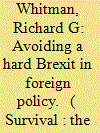

|
|
|
|
|
| Summary/Abstract |
The current public image of the Brexit process is of a British government negotiating with itself while simultaneously making little progress in Article 50 talks with the EU. It is perhaps inevitable that disputes over money, borders, citizens and a future trading relationship should overshadow other areas where the EU and UK could develop an effective post-Brexit partnership. Foreign, security and defence policy are areas where a departure from the existing intertwined relationship between the UK, the EU and the 27 other member states would have mutually detrimental effects.
|
|
|
|
|
|
|
|
|
|
|
|
|
|
|
|
| 2 |
ID:
145283
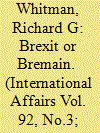

|
|
|
|
|
| Summary/Abstract |
A major public debate on the costs and benefits of the United Kingdom's membership of the European Union is presently under way. The outcome of the referendum on 23 June 2016 will be a pivotal moment in determining whether the EU has a future as a component of the UK's European diplomatic strategy or whether there is a major recalibration of how the UK relates to Europe and more widely of its role within international relations. Since accession to the European Economic Community the UK has evolved an uncodified, multipronged European diplomatic strategy. This has involved the UK seeking to reinforce its approach of shaping the security of the continent, preserving a leading diplomatic role for the UK in managing the international relations of Europe, and to maximize British trade and investment opportunities through a broadening and deepening of Europe as an economically liberal part of the global political economy. Since accession the UK's European diplomatic strategy has also been to use membership of the EU to facilitate the enhancement of its international influence, primarily as a vehicle for leveraging and amplifying broader national foreign and security policy objectives. The strategy has been consistent irrespective of which party has formed the government in the UK. Increasing domestic political difficulties with the process of European integration have now directly impacted on this European strategy with a referendum commitment. Whether a vote for a Brexit or a Bremain, the UK will be confronted with challenges for its future European strategy.
|
|
|
|
|
|
|
|
|
|
|
|
|
|
|
|
| 3 |
ID:
095116
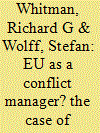

|
|
|
|
|
| Publication |
2010.
|
| Summary/Abstract |
This article offers an analysis of the EU's engagement in Georgia as a standpoint from which to assess the EU's role as a conflict manager. The article begins with a brief narrative account of the development of EU-Georgia relations in the context of the country's two unresolved conflicts over Abkhazia and South Ossetia. It then proceeds to the analysis of two sets of factors-those within, and those external to, the EU-that are crucial for understanding the nature and impact of EU efforts to manage the two Georgian conflicts. On the basis of this case-study analysis, the authors offer a wider analysis of the EU's potential for assuming a wider role as an international security actor. This is undertaken by considering both the limitations of the EU's existing capabilities for conflict resolution and the new developments contained within the Lisbon Treaty. The final part of the article asserts that the EU has suffered from two key weaknesses that have prevented it from living up to its aspirations of becoming a globally significant and effective conflict manager. The first is structural-the lack of, to date, a permanent External Action Service; the second is conceptual-the lack of a coherent and comprehensive conflict management strategy. The article concludes with five substantive principles that should guide the EU's approach to conflict management.
|
|
|
|
|
|
|
|
|
|
|
|
|
|
|
|
| 4 |
ID:
076524


|
|
|
|
|
| Publication |
2007.
|
| Summary/Abstract |
Tony Blair's decision to provide an indication of his departure date from 10 Downing Street has generated interest in the policies and style of his most likely successor, the current UK Chancellor of the Exchequer, Gordon Brown. Brown's ambitions for European policy are considered by a number of commentators to be less clear. This is because so far he has not produced a comprehensive vision of how he sees the UK's future relationship with the EU. However, as this article demonstrates, close examination reveals that his position on many aspects of European policy is actually already well documented.
|
|
|
|
|
|
|
|
|
|
|
|
|
|
|
|
| 5 |
ID:
049672


|
|
|
|
|
| Publication |
Manchester, Manchester University Press, 2000.
|
| Description |
xi, 284p.
|
| Standard Number |
0719057787
|
|
|
|
|
|
|
|
|
|
|
|
Copies: C:1/I:0,R:0,Q:0
Circulation
| Accession# | Call# | Current Location | Status | Policy | Location |
| 044225 | 327.4/MAN 044225 | Main | On Shelf | General | |
|
|
|
|
| 6 |
ID:
061075
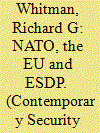

|
|
|
| 7 |
ID:
120735


|
|
|
|
|
| Publication |
2013.
|
| Summary/Abstract |
Introduced by Ian Manners in an article published in 2002, the idea of 'normative power Europe' has been very widely debated by scholars in the fields of European studies and international relations. This article marks the first decade of scholarship on normative power Europe through a critical engagement with the concept, its influence and the wider normative turn within the literature on the European Union's role beyond its borders. The article reviews the strands of literature that have drawn on the concept of normative power and outlines the contours of the international debate on the concept. It provides an assessment of the impact of normative power and its application through the variety of ways it has been used via engagement, reaction and counter-reaction.
|
|
|
|
|
|
|
|
|
|
|
|
|
|
|
|
| 8 |
ID:
123881
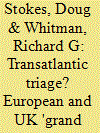

|
|
|
|
|
| Publication |
2013.
|
| Summary/Abstract |
Transition in the Middle East, the ongoing effects of the global financial crisis and the United States' rebalance to Asia are key trends that will have an impact on transatlantic relations and European defence. As US priorities shift, a common European 'grand strategy' could encourage the development of a shared vision to help Europe order its priorities and begin to respond to the new, post-austerity context of world politics and shrinking defence budgets.
Will these changes be enough to quicken Europe's currently shrivelled strategic thinking? In any scenario, given its relative weight and role as an interlocutor with the US, the United Kingdom will remain vital to any developing European security and strategy agenda, although its broader relations with the European Union will complicate this relationship. How it proceeds will also help to define the boundaries of this nascent European security order.
This article charts these key global trends, relates them to current debates in European security and strategy and maps opportunities and constraints faced by Europe and the UK in developing a grand strategy in an increasingly 'American-lite' European neighbourhood.
|
|
|
|
|
|
|
|
|
|
|
|
|
|
|
|
| 9 |
ID:
145563


|
|
|
|
|
| Summary/Abstract |
Foreign and security policy were not areas in which Prime Minister Cameron was seeking to renegotiate the relationship between the UK and the European Union (EU), but security may be a key issue in the EU referendum. The untangling of Britain's foreign and security policy from the EU following a Brexit vote would be relatively uncomplicated. The EU's arrangements for collective foreign and security policy, the Common Foreign and Security Policy (CFSP) and Common Security and Defence Policy (CSDP), are conducted on an intergovernmental basis which allows the UK to preserve independence in its diplomacy while allowing for the coordination of policy where interests are held in common with other member states. The UK retains substantial diplomatic and military capabilities which would allow it to continue to pursue a separate national foreign, security and defence policy in the case of either a ‘Leave’ or ‘Remain’ outcome.
|
|
|
|
|
|
|
|
|
|
|
|
|
|
|
|
| 10 |
ID:
165047


|
|
|
|
|
| Summary/Abstract |
The UK's departure from the European Union (EU) represents a major shift in the diplomatic strategy of one of Europe's leading economic, diplomatic and security players. This article limits its focus to the UK's European diplomatic strategy. The article argues that the UK's future relationship with the EU will condition the UK's broader diplomatic approach to Europe. But in exiting the EU the ambitions and modalities of the UK's other bilateral and multilateral relationships in Europe will undergo a recalibration. With the UK government having struggled since June 2016 to provide comprehensive detail on its ambitions for its future economic, political and security relationship with the EU, the development of the broader aspects of the UK's post-Brexit European diplomatic strategy has been retarded. However, through analysis of key speeches, government white papers, and other supporting documents and statements (and the experience of negotiating Brexit with the EU27), the outlines of a nascent post-Brexit UK European diplomatic strategy can be discerned. Whether this strategy will be adequate to provide the UK with a significant degree of influence on Europe's international relations and whether it gives the UK sufficient ability to addresses the key challenges that it will face in Europe is less certain.
|
|
|
|
|
|
|
|
|
|
|
|
|
|
|
|
|
|
|
|
|